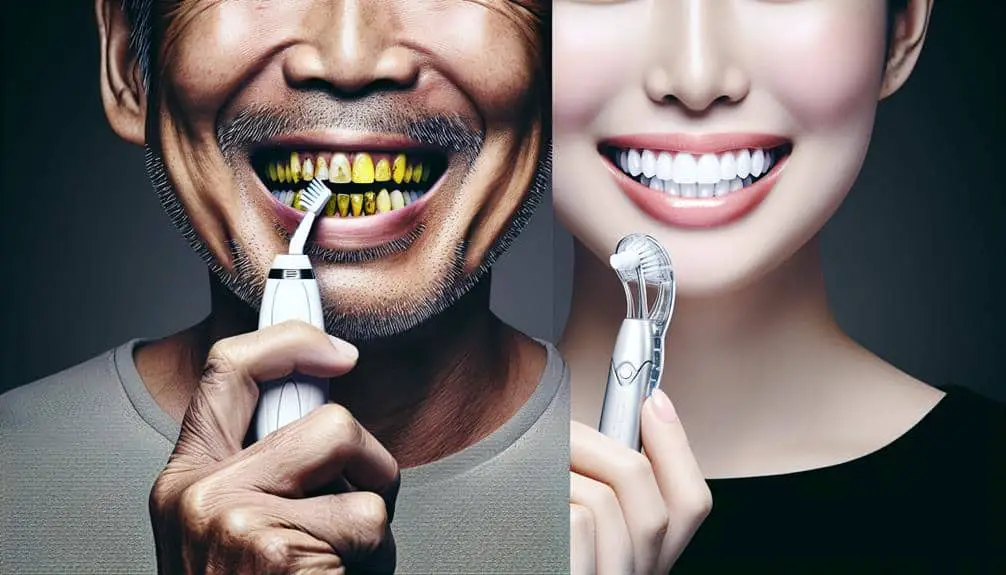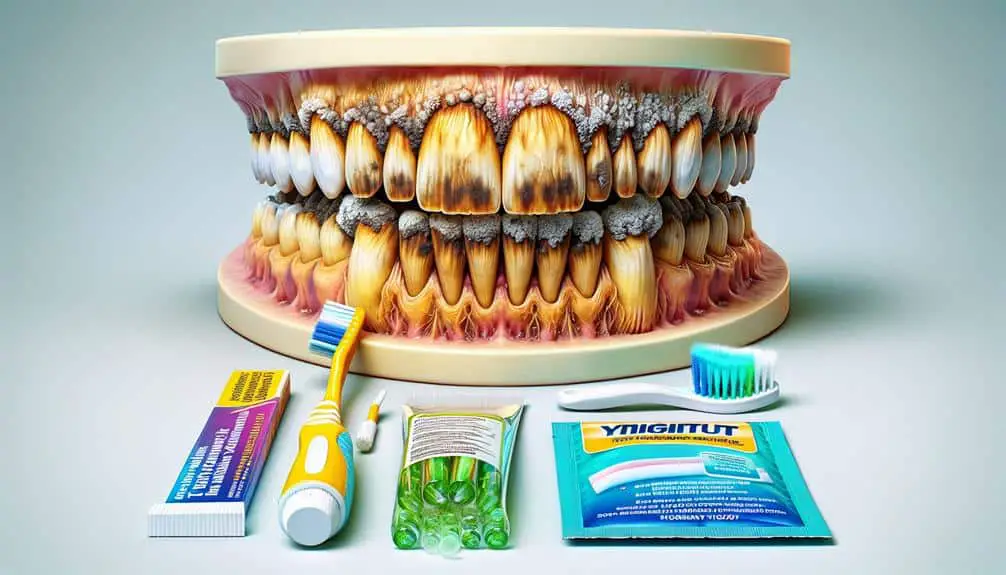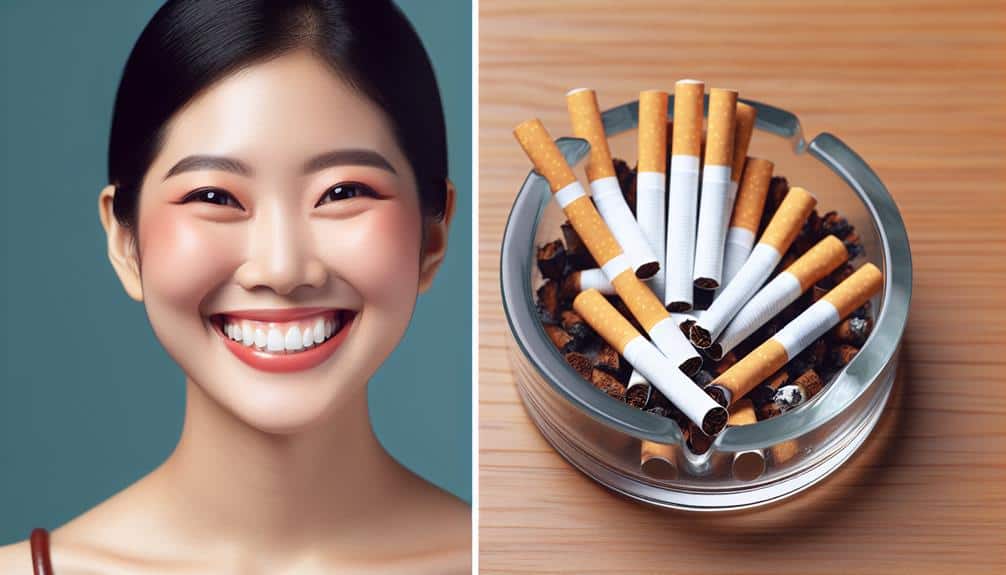If you're a smoker aiming to brighten your smile, professional dental whitening treatments supervised by trained professionals offer cost-effective and noticeable improvements. Incorporating whitening toothpaste and mouthwash into your routine, preferably ADA-approved, can aid in removing surface stains effectively with hydrogen peroxide or carbamide peroxide. At-home whitening kits provide customizable experiences for gradual brightening, while oil pulling with coconut oil may help reduce plaque buildup and bad breath. Charcoal whitening products can remove stains, but consult your dentist due to potential enamel risks. Laser whitening procedures offer noticeable results in a single session, worth considering for long-term effects.
For a natural approach, consider DIY methods like baking soda paste or coconut oil pulling. These methods, combined with healthy eating habits, can help you achieve a brighter smile.
Key Points
- Professional dental whitening treatments for effective results.
- Whitening toothpaste and mouthwash with hydrogen peroxide.
- At-home whitening kits for gradual improvement.
- Oil pulling with coconut oil for oral health.
- Consult dentist before using charcoal whitening products.
Professional Dental Whitening Treatments
If you're a smoker looking to whiten your teeth, professional dental whitening treatments may offer you the most effective results. Dental bleaching procedures, like Zoom whitening, provide professional results that can greatly lighten the stains caused by smoking. These treatments are considered cost-effective in the long run due to their ability to deliver noticeable improvements in a single visit to the dentist.
Zoom whitening, a popular in-office procedure, involves a bleaching gel applied to your teeth, which is then activated by a special light to accelerate the whitening process. This method can whiten teeth by several shades in just one session, making it a convenient option for busy individuals seeking immediate results.
Professional dental whitening treatments are supervised by trained professionals who can customize the procedure to suit your individual needs, ensuring maximum effectiveness and safety. Although the initial cost may be higher than at-home alternatives, the long-lasting and significant results make these treatments a worthwhile investment for smokers looking to enhance their smile.
Whitening Toothpaste and Mouthwash
To improve the appearance of your teeth, start by incorporating whitening toothpaste into your daily brushing routine. These toothpastes contain abrasives or chemicals that help remove surface stains and polish your teeth.
Follow up by using a whitening mouthwash to freshen your breath and further enhance the whitening effect.
Brush With Whitening Toothpaste
Consider incorporating whitening toothpaste and mouthwash into your oral hygiene routine to help combat teeth discoloration caused by smoking. Whitening toothpaste contains polishing agents and mild abrasives that can help remove surface stains from smoking.
Here are some tips for using whitening toothpaste effectively:
- Choose a reputable brand: Look for whitening toothpaste that carries the ADA (American Dental Association) seal of acceptance.
- Brush gently: To avoid damaging enamel, brush your teeth gently in circular motions.
- Be consistent: Use the whitening toothpaste regularly as recommended for best results.
- Pair with a soft-bristled brush: Using a soft-bristled toothbrush can help prevent damage to your gums and enamel.
In addition to addressing teeth discoloration, remember that maintaining healthy gums through proper flossing benefits your overall oral health.
Rinse With Whitening Mouthwash
Incorporate whitening mouthwash into your oral hygiene routine to further enhance the effects of whitening toothpaste and combat teeth discoloration from smoking.
Whitening mouthwash benefits include helping to remove surface stains, freshening breath, and promoting overall oral health.
When selecting a whitening mouthwash, look for products containing hydrogen peroxide or carbamide peroxide, as these ingredients are effective in whitening teeth.
It's crucial to follow the instructions carefully to avoid potential side effects like tooth sensitivity.
For smokers, using a mouthwash specifically formulated for smokers can be beneficial as it targets the stains caused by smoking.
Remember that while whitening mouthwash can be a valuable addition to your routine, it shouldn't replace regular brushing and flossing for best oral health.
At-Home Teeth Whitening Kits
When exploring teeth whitening options as a smoker, you may find at-home whitening kits to be a convenient and effective solution for brightening your smile. These kits typically contain whitening gel and trays that mold to your teeth, allowing for easy application and consistent results. Here are some key points to contemplate when using at-home teeth whitening kits:
- Customizable Whitening: At-home kits often provide customizable whitening experiences, allowing you to adjust the frequency and duration of treatments based on your needs.
- Gradual Results: While not as immediate as professional treatments, at-home kits can still provide noticeable results over time with regular use.
- Safety Precautions: Follow the instructions carefully to prevent gum irritation or tooth sensitivity. If in doubt, consult with your dentist before starting the whitening process.
- Cost-Effectiveness: Compared to in-office treatments, at-home whitening kits are generally more affordable, making them a budget-friendly option for smokers looking to enhance their smile.
Oil Pulling for Whiter Teeth
Exploring alternative methods for achieving whiter teeth, oil pulling is a natural technique that has gained popularity for its potential dental benefits. Coconut oil, known for its antimicrobial properties, is commonly used in oil pulling. The process involves swishing a tablespoon of coconut oil around in your mouth for about 15-20 minutes, then spitting it out. This practice is believed to help remove bacteria and promote oral health maintenance.
Oil pulling with coconut oil may contribute to teeth whitening by reducing plaque buildup and improving gum health. While scientific evidence on the direct teeth-whitening effects of oil pulling is limited, it can be a complementary method to traditional oral hygiene practices. Additionally, the antibacterial properties of coconut oil may help combat bad breath and support overall oral health.
Incorporating oil pulling with coconut oil into your oral care routine may provide benefits beyond just teeth whitening, making it a natural and holistic approach to maintaining oral hygiene.
Charcoal Whitening Products
Charcoal whitening products have gained popularity in the dental care industry for their potential to enhance teeth brightness by adsorbing surface stains. When considering using charcoal products for teeth whitening, it's important to weigh the benefits and risks associated with this method.
- Charcoal Toothpaste Benefits: Charcoal toothpaste can help remove surface stains effectively, leading to a brighter smile.
- Charcoal Toothpaste Risks: Abrasive nature of charcoal can potentially wear down enamel if used excessively, leading to sensitivity.
- Charcoal Teeth Whitening Effectiveness: Studies have shown that charcoal can effectively remove surface stains, but long-term effects on enamel health are still under research.
- User Experience: Many users report noticeable whitening effects after regular use, but individual results may vary.
Before incorporating charcoal whitening products into your dental care routine, consult with your dentist to make sure it aligns with your oral health needs.
Laser Teeth Whitening Procedures
When contemplating advanced teeth whitening solutions, laser procedures offer a promising option to achieve a brighter smile efficiently and effectively. Laser techniques used in professional clinics can provide noticeable results in a single session, making them a popular choice for individuals looking for immediate improvements in teeth discoloration caused by smoking or other factors.
One significant advantage of laser teeth whitening is its long-term effects. The treatment can remove deep stains and enhance the overall appearance of your teeth, resulting in a lasting whitening effect. Additionally, the precision of laser technology allows for targeted whitening, ensuring consistent results across all teeth.
However, it's crucial to take into account cost considerations when opting for laser teeth whitening. Professional clinics offering laser procedures may have higher price points compared to at-home whitening kits or other methods. Nevertheless, many individuals find the investment worthwhile due to the speed and effectiveness of laser treatments in achieving a noticeably whiter smile.
Natural Remedies for Brighter Smiles
Looking to brighten your smile naturally?
DIY teeth whitening methods and maintaining healthy eating habits can help you achieve a brighter, whiter smile.
Simple practices like using baking soda or eating crunchy fruits and vegetables can contribute to a more radiant smile without the need for harsh chemicals.
DIY Teeth Whitening
Consider incorporating natural remedies into your dental routine to achieve a brighter smile through DIY teeth whitening methods. Here are some effective natural alternatives for stain removal:
- Baking Soda: Create a paste using baking soda and water, then brush gently to remove surface stains.
- Strawberries: The malic acid in strawberries can help whiten teeth; mash them and apply to your teeth for a few minutes before rinsing.
- Activated Charcoal: Known for its absorbing properties, it can bind to stains and toxins on the teeth.
- Coconut Oil Pulling: Swishing coconut oil in your mouth may reduce bacteria and whiten teeth over time.
These DIY methods offer a cost-effective and natural approach to achieving a brighter smile.
Healthy Eating Habits
Incorporate healthy eating habits into your daily routine to naturally enhance the brightness of your smile. Opt for balanced meals rich in nutrients like fruits, vegetables, lean proteins, and whole grains to support overall oral health.
Choose nutrient-packed snacks such as apples, carrots, or almonds that can help scrub away surface stains and promote saliva production, aiding in the prevention of tooth decay. Foods high in vitamin C, like strawberries and oranges, can also help whiten teeth by reducing plaque buildup.
Additionally, dairy products like cheese and yogurt contain calcium and phosphates that strengthen enamel and contribute to a brighter smile. By making mindful food choices, you can work towards a healthier, brighter smile from the inside out.
Frequently Asked Questions
Are There Any Specific Teeth Whitening Methods That Are More Effective for Smokers Compared to Non-Smokers?
To effectively combat nicotine stains on your teeth, consider smoking cessation as a key step. Teeth whitening methods may be more successful after quitting smoking. Consult with your dentist for personalized advice on the best approach for your oral health.
Can Smoking While Undergoing a Teeth Whitening Treatment Affect the Results?
When smoking during a teeth whitening treatment, the nicotine stains can hinder the efficacy of the process, affecting the whitening results. Consider smoking cessation to optimize the outcome and maintain a brighter smile.
Are There Any Long-Term Effects of Smoking on Teeth Whitening Results?
When considering the long-term effects of smoking on teeth whitening results, your smoking habits play a significant role in the outcome. Consistent smoking can impact the longevity and effectiveness of whitening treatments over time.
How Often Should Smokers Undergo Teeth Whitening Treatments to Maintain Results?
To maintain whitening results as a smoker, consider treatments every 6-12 months. Brush after smoking, use whitening toothpaste, and limit staining foods. Regular dental check-ups are essential. Commit to a good oral hygiene routine for lasting brightness.
Are There Any Special Precautions Smokers Should Take Before Trying Teeth Whitening Methods to Ensure Safety and Effectiveness?
Before attempting teeth whitening methods, take precautions for safety and effectiveness. Consider pre-treatment measures like dental cleaning and consulting your dentist. Follow guidelines for best results. These steps help guarantee a successful whitening experience.
Conclusion
For smokers seeking a brighter smile, consider trying these 7 best teeth whitening methods.
From professional dental treatments to natural remedies, there are plenty of options to help you achieve a whiter smile.
Remember, consistency is key when it comes to maintaining your results.
So, start incorporating these techniques into your daily routine to see a noticeable improvement in the brightness of your teeth.
Happy whitening!



